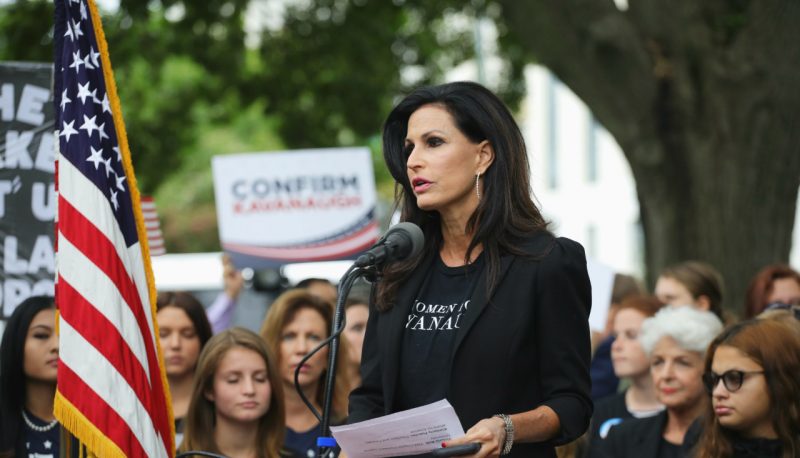The U.S. House of Representatives passed a resolution, 232-183, Thursday to clear the path for final passage of the Equal Rights Amendment by removing the proposed amendment’s 1982 ratification deadline. The amendment, commonly known as the ERA, would guarantee equal rights regardless of sex under the U.S. Constitution. Right-wing, pro-life groups are up in arms, arguing it would lead to “abortion on demand.”
First passed by Congress in 1972, the ERA needed 38 states to ratify it in order for it to be added to the Constitution, but it failed to do so before the deadline set by Congress, largely due to organizing by the late right-wing activist Phyllis Schlafly. In recent years, a number of states have ratified the ERA, with Virginia becoming the 38th state to do so last month. With the 38 states required for ratification having weighed in with a “yes,“ the Democratic-controlled House revisited the deadline Thursday and repealed the deadline largely along party lines, with five Republicans joining Democrats.
Democratic lawmakers argued the time limit on ERA ratification is open to change, pointing to legal precedents, citing the importance of having equality of the sexes enshrined in the Constitution.
In the 70s and 80s, right-wing groups, led by Schlafly, had argued that it would force women into combat, that it would lead to the destruction of the family, and that women already have plenty of rights under the Constitution.
On Thursday, some of those arguments persisted. Republicans argued that the ERA is dead since the deadline had passed, but they also honed in on abortion, arguing, according to Politico, “that because only women can have abortions, any restrictions on the procedure could be deemed unconstitutional under the ERA.” In other words, the right’s efforts to limit women’s access to abortion and make abortion illegal would be unconstitutional.
Susan B. Anthony List, a dark–money group that promotes antichoice political candidates, argued that “Women are already equal,” and suggested that the ERA should be named the “abortion rights amendment.” The group tweeted:
Women are already equal.
The #EqualRightAmendment is a sham, more aptly named the "abortion rights amendment."
You're the one stuck in the middle ages, supporting sentencing innocent "unwanted" members of society to death without a trial. https://t.co/N8ClLCLWcV
— Susan B. Anthony List (@SBAList) February 13, 2020
Ed Martin’s Phyllis Schlafly Eagles—named after the late conservative activist—took issue with a women’s right to her body, arguing in a tweet, “Radical feminists want to ‘codify women’s bodily autonomy’ into the Constitution. They said it, in this video. It’s not about equality – it’s about unlimited abortions.”
Radical feminists want to “codify women’s bodily autonomy” into the Constitution. They said it, in this video. It's not about equality – it's about unlimited abortions. https://t.co/i9EvdLd9C9 pic.twitter.com/4UsuMJPSRw
— Phyllis Schlafly Eagles (@PhyllisSchlafly) February 13, 2020
In a column in The Daily Caller, Penny Nance, the president and CEO of the antichoice Concerned Women for America, called the ERA the “Dems’ Frankenstein Monster.” She warned that “any limits on abortion or denying taxpayer-funds for abortion could be seen as a form of sex discrimination and a violation of the amendment.”
Nance also suggested that providing equal rights would eliminate “provisions in the Violence Against Women Act; programs such as Women, Infants, and Children (WIC); special protections in marriage, divorce, alimony, and child custody; accommodations for pregnant women in the workforce; spousal social security benefits; female protections on college campuses relating to safety, Title IX, scholarships, and admissions.”
Such arguments are dismissed by proponents of the ERA. States with their own equal rights amendments have seen that that does not in fact happen: “Court decisions in states with ERAs show that the benefits that opponents claim women would lose are not in fact lost,” states an ERA website by the Alice Paul Institute (named after the woman suffrage leader and author of the Equal Rights Amendment).
The Family Research Council, a religious-right organization that has railed against women’s access to abortion and LGBTQ rights, argued that the “ERA is not about women.” The group tweeted:
Members of Congress should not be fooled. If the #ERA really was about protecting women, it would define “women” by biological sex.
The ERA is not about women; it is about abortion, and countless innocent lives are on the line. https://t.co/9znqWLO3nD— FRC (@FRCdc) February 13, 2020
Despite the deadline removal today, the ERA faces an uphill battle. Conservatives have pointed to a conversation with Supreme Court Justice Ruth Bader Ginsburg at Georgetown University Monday in which the justice said, “I would like to see a new beginning” for ERA ratification. She also said there is “too much controversy about latecomers,” and that “a number of states have withdrawn their ratification.”
The deadline removal isn’t likely to be taken up by the Republican-controlled Senate, and the ERA faces a lawsuit from state attorneys general in red states and opposition from the Justice Department’s Office of Legal Counsel, which claims that it has “expired.” The battle for the ERA to move forward will likely play out in federal courts, religious-right organizations poised to throw their full weight against its advancement.








